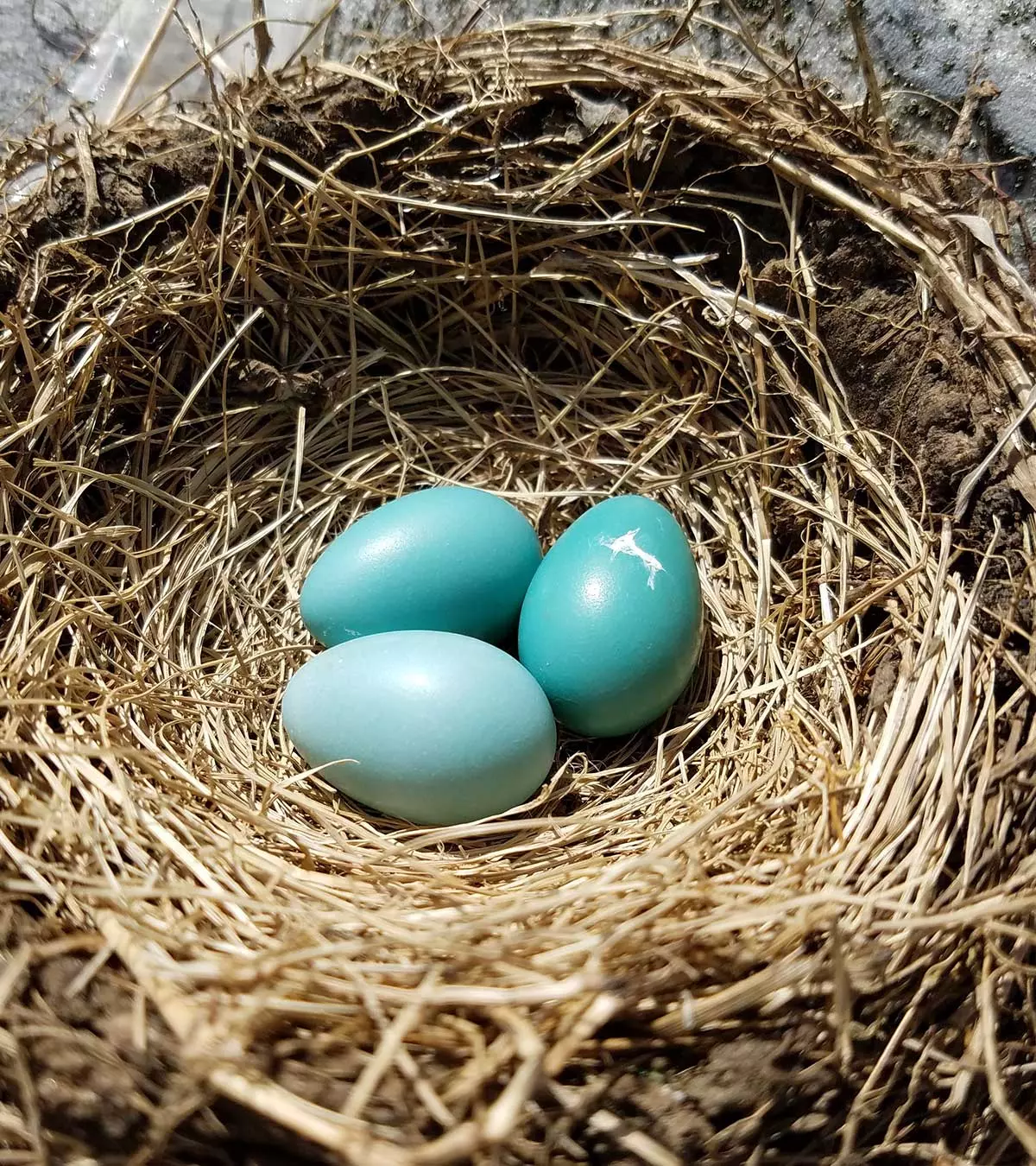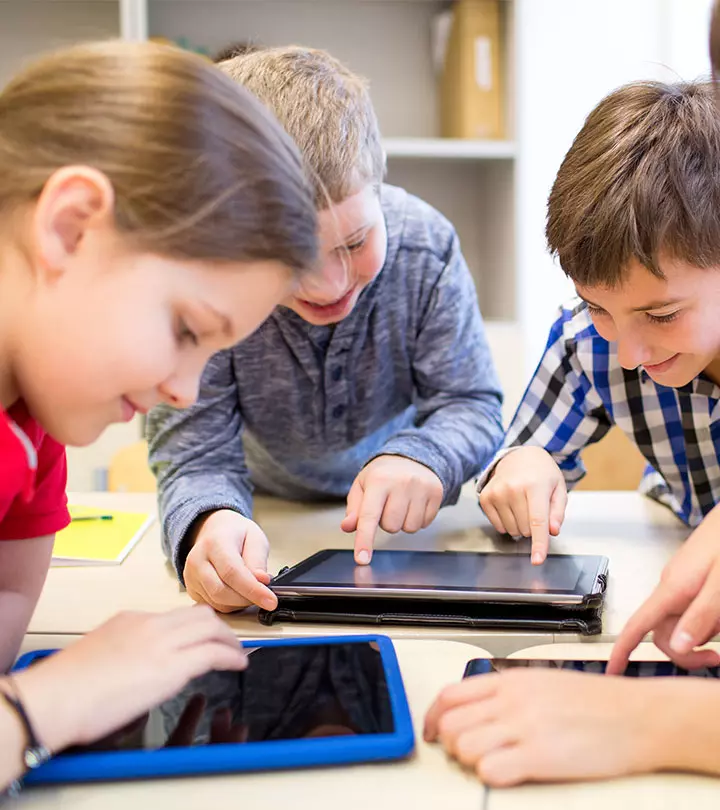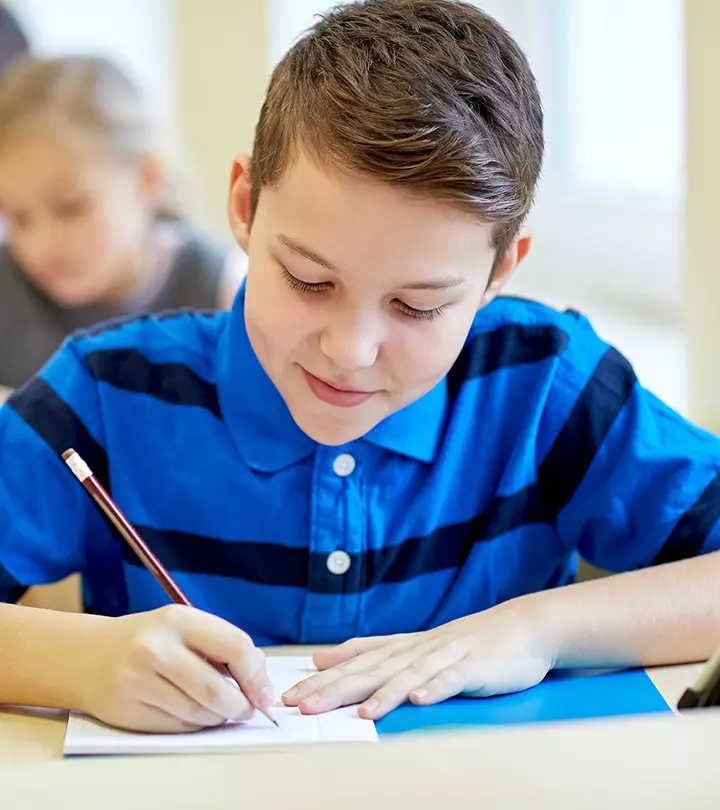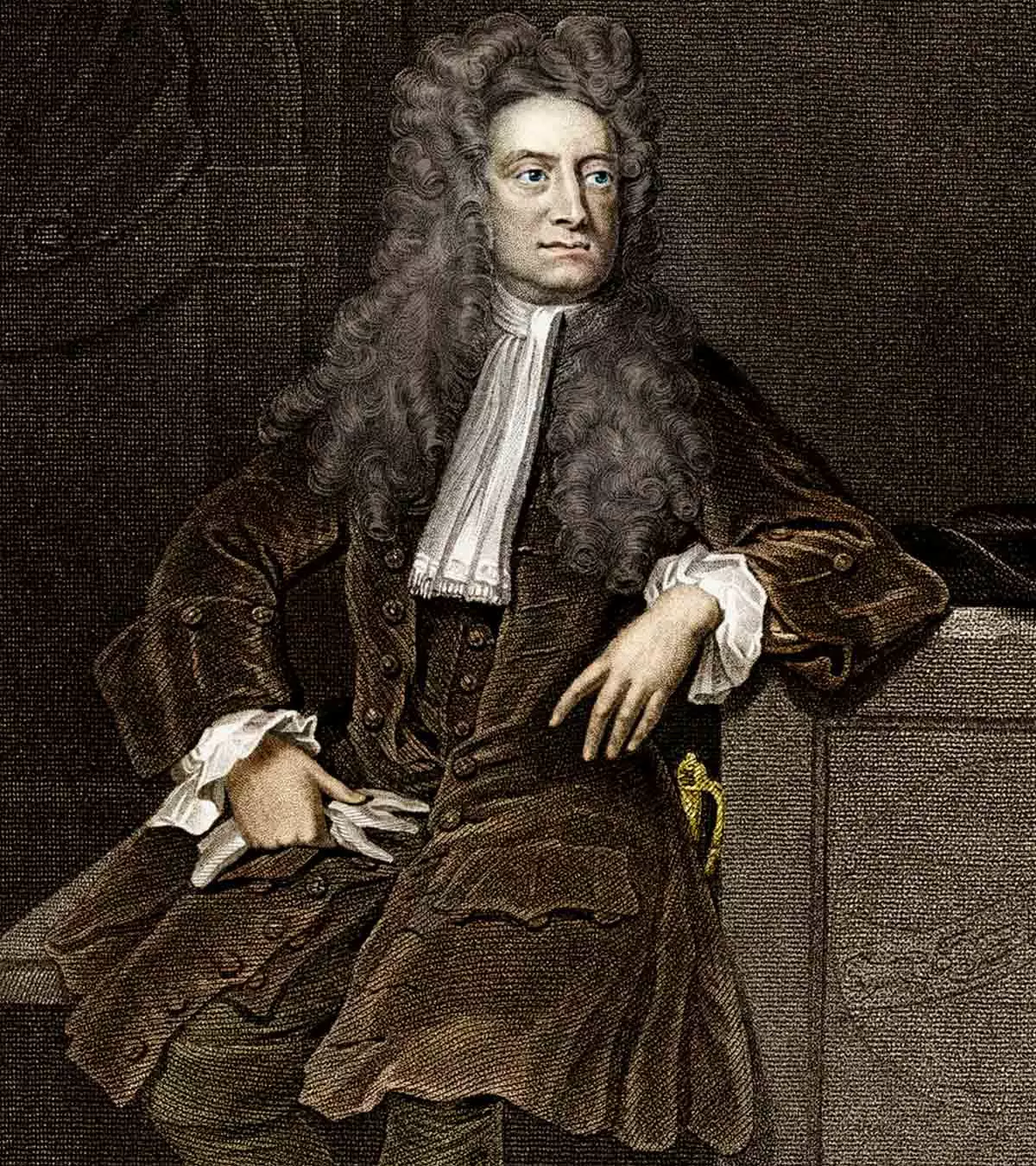
Image: iStock
Isaac Newton (1643-1727) was an English physicist and mathematician. He was one of the foremost scientists of all time, knowing who could be inspirational. So, here we bring you some Issac Newton facts for kids that will help your child know about his life, education, family, contributions, inventions, discoveries, and renowned accomplishments that laid the foundation for several future research works. Introducing children to his science and technology development works will encourage and ignite young minds to be industrious and innovative. Read on as we take you through the personal and professional journey of one of the most renowned, respected, and ingenious personalities in human history.
Key Pointers
- Kids are taught about Sir Isaac Newton, a physicist and mathematician who laid the foundation for modern physics.
- Among his many revolutionary discoveries was the discovery of the earth’s shape–oblate spheroidal.
- His book, Philosophiae Naturalis Principia Mathematica, is the greatest in the history of science.
- He wrote his books in Latin, the international science language of that time. Scroll down for more facts about him.
Isaac Newton Biography
Early life
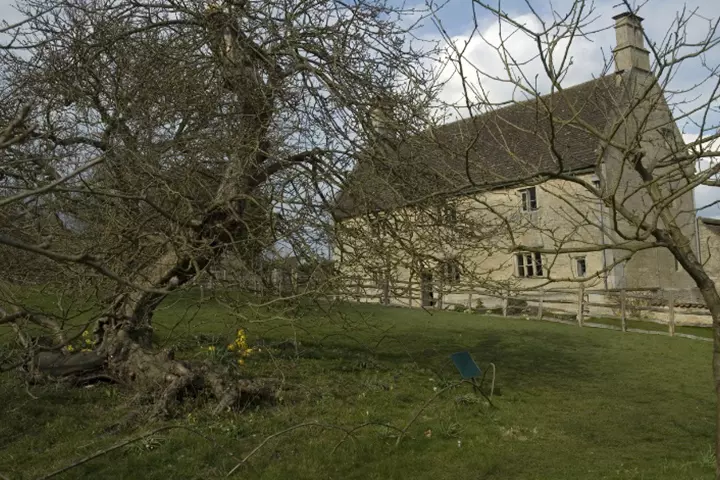
Image: IStock
Isaac Newton was born into a puritan family in Woolsthorpe, Lincolnshire, England, on January 4, 1643 (December 25, 1642, according to the old Julian calendar).
He was the only son of Isaac and Hannah Ayscough Newton. Isaac’s father died three months before his birth. Three years after his father’s death, his mother married the 63-year-old Barnabas Smith and moved with him, leaving Isaac under the care of his maternal grandparents (1).
Isaac Newton as a child
Isaac Newton’s mother and grandmother, who were literate, taught him how to read and write. In 1653, after Smith died, Hannah returned to Woolsthorpe with her three other children. Newton was enrolled in The King’s School Grantham, a free grammar school in Lincolnshire, where he was introduced to the fascinating world of chemistry.
When Isaac was 12 years old, he was pulled out of school by his mother to become a farmer. He failed dismally and found farming boring.
Later on, Hannah’s brother, the headmaster of the Grantham school, persuaded his mother to let Isaac pursue studies. Newton continued with his studies at Grantham, and in 1661, he joined Trinity College, where he was older than most of his classmates.
College and career
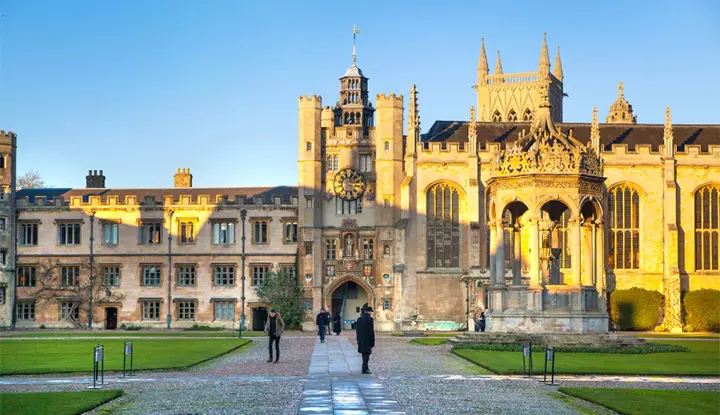
Image: IStock
- In 1665, after completing his BA from Trinity College, he returned home because of the temporary closure of the university due to The Great Plaque.
- The years 1665 and 1666 were the most productive years of his life. He laid the groundwork for his famous theories in mathematics, optics, physics, and astronomy, such as gravitation, calculusi, optics experiment, and laws of motion.
- He returned to Cambridge in 1667, where he was elected as a Fellow of Trinity and later became the Lucasian Professor of Mathematics in 1669.
- Newton was selected as a Fellow of the Royal Society (FRS) in 1672.
- He published “Philosophiae Naturalis Principia Mathematica” (Mathematical Principles of Natural Philosophy), one of his primary research works that laid the foundations for classical mechanics in 1687. Newton’s Principia is a work consisting of three books, which Newton prepared during The Great Plague.
- In 1689, he was elected to the Parliament, where he served for one year.
- He was appointed as Warden of the Mint in 1696 and as the Master of the Mint in 1700 (2).
 Did you know?
Did you know?Sir Isaac Newton family
Isaac Newton was born to Isaac Newton Sr. and Hannah Ayscough. He did not have any siblings of his own, but had three half-siblings from his mother’s second marriage — two half-sisters Hannah Smith Pilkington and Mary Smith, and a half-brother Benjamin Smith.
Isaac Newton was not married and did not have any children. Towards the end of his life, Newton lived at Cranbury Park, near Winchester, England, with his niece, Catherine (Barton) Conduitt, and her husband, John Conduitt.
How Newton Became A Scientist
- The works of outstanding thinkers and scientists such as Aristotle, Copernicus, Johannes Kepler, Rene Descartes, Hobbes, Boyle, and Galileo were said to have inspired Newton.
- Legend has it that an apple falling from a tree inspired Newton to discover the law of gravity.
- His formulas of gravitation and motion are considered the basis of modern physics.
 Quick fact
Quick fact- His reflecting telescopeiA telescope that uses curved mirrors for reflecting light and producing an image. was a significant breakthrough in the field of opticsiA field under physical sciences dealing with the study of properties and interactions of light. .
Interesting Facts About Isaac Newton For Kids
Here are a few interesting facts about Isaac Newton you might not have known.
- Considered one of the most influential scientists and astronomers in history, Newton is best known for his theory about the law of gravity.
- Apart from developing and working on various ideas on celestial machines, light, and calculus, he is also known for his three laws of motion.
- Newton wrote books in Latin as, during his time, it was the International language of science.
- He played a significant role in developing the principles of modern physics and laws of motion (5).
- Newton was not very social as a person.
- When he was a professor at Cambridge, his lectures were poorly attended. Newton was more interested in his research works than teaching.
- He was a student of alchemyiAn ancient science of chemistry and philosophy that dealt with the transformation of one substance into another. and Biblical history (6).
- Until his death in 1727, He served as the president of the Royal Society of London and master of England’s Royal Mint.
- In 1705, he was Knighted by Queen Anne. Hence, he came to be known as Sir Isaac Newton (7).
- Isaac Newton’s scientific discoveries include:

Image: IStock
a. Gravity
b. Three laws of motion
c. The oblate spheroidal shape of the Earth
d. Newton’s method
e. Calculus
f. Reflecting telescope
- He was the first person to construct a reflecting telescope.
- Newton was known to have suffered nervous breakdowns in 1678 and 1693.
- In the later years of his life, he became more interested in politics than research.
- Newton’s Philosophiae Naturalis Principia Mathematica, also called Principia, is recognized as the greatest scientific book ever written.
Sir Isaac Newton: Famous Quotes
- “If I have seen further, it is by standing on the shoulders of Giants.”
- “Truth is the offspring of silence and meditation. I keep the subject constantly before me and wait ’til the first dawning opens slowly, by little and little, into a full and clear light.”
- “A man may imagine things that are false, but he can only understand things that are true.”
- “I can calculate the motion of heavenly bodies but not the madness of people.”
- “Live your life as an Exclamation rather than an Explanation.”
- “What we know is a drop; what we don’t know is an ocean.”
- “Gravity explains the motions of the planets, but it cannot explain who sets the planets in motion.”
- “No great discovery was ever made without a bold guess.”
- “What goes up must come down.”
- “Truth is ever to be found in the simplicity, and not in the multiplicity and confusion of things.”
- “To every action there is always opposed an equal reaction.”
- “Genius is patience.”
- “To myself, I am only a child playing on the beach, while vast oceans of truth lie undiscovered before me.”
- “If I have ever made any valuable discoveries, it has been owing more to patient attention, than to any other talent.”
- “We build too many walls and not enough bridges.”
- “If others would think as hard as I did, then they would get similar results.
Isaac Newton Books For Kids

Image: Amazon books
Here is a list of books about Newton for children to read.
- Newtonian Physics for Babies (Baby University) by Chris Ferrie
- Who Was Isaac Newton? By Janet B. Pascal
- Isaac Newton and the Laws of Motion (graphic novel) by Andrea Gianopolous
- Isaac Newton (Giants of Science) by Kathleen Krull
- Newton’s Rainbow: The Revolutionary Discoveries of a Young Scientist by Kathryn Lasky
- Isaac Newton and Physics for Kids: His Life and Ideas with 21 Activities by Kerrie Logan Hollihan
Newton passed away in his sleep at the age of 84 on March 20, 1727, and he was buried in Westminster Abbey, London. After his death, the analysis of his body and hair samples indicated the presence of mercury, which was probably due to his experimentations. Hence, the cause of death is primarily mercury poisoning.
Frequently Asked Questions
1. Why is Newton the greatest scientist?
The contributions to science by Sir Isaac Newton because his discovery of gravity has had a significant impact on humankind. His other two great discoveries – the nature of white light and calculus also played a pivotal role in shaping the world into what we see it as today. Therefore, Newton is considered to be one of the greatest scientists of all time.
2. What was Isaac Newton’s theory of gravity?
Newton explains gravity as an ever-present force, a tug that all objects exert on the nearby objects. The mass of an object is directly proportional to the tug, meaning the more the mass, the stronger the tug. The distance between two objects is inversely proportional to the attraction between them, the more the distance, the weaker the attraction.
3. What are the three Newton’s laws of motion?
Newton’s first law of motion: An object will stay at rest or in motion unless a force acts on it.
Newton’s second law of motion: Force equals mass times acceleration.
Newton’s third law of motion: There is an equal and opposite reaction for every action, and forces come in pairs.
4. What lessons can children learn from Isaac Newton’s life and work?
The aspects of perseverance, curiosity, innovativeness, critical thinking, attention to detail, and problem-solving are some important lessons children can learn from Isaac Newton’s life and work.
5. Who was Isaac Newton’s teacher?
Isaac Newton was educated by his mother for most of his life, after which he joined schools and colleges for further education. Other teachers who contributed to his growth and success are Dr. William Stuckley and Headmaster Henry Stokes at the King’s School and Isaac Barrow at Cambridge University (9).
Sir Isaac Newton invented and clarified some of the most fundamental scientific principles. He made significant contributions to the field of science. In addition, he has largely influenced how people think of the universe. Knowing the facts and contributions of Sir Isaac Newton can inspire young minds. Their curious minds may have several questions, and answers to them can expand their knowledge. These fun facts about Isaac Newton for kids may particularly interest children who are inclined and fascinated by science and physics. If they are interested in learning more about trailblazers in the field of science, you may also introduce them to facts about Albert Einstein for kids. Learning about these people from a young age can inspire them to eventually develop scientific thinking and who knows, maybe they will too, one day, grow up to be like their idols.
Infographic: Newton’s Reflective Telescope
Newton’s reflective telescope was a modification of the Galileo telescope. Here is an infographic that presents the notable additional features Newton suggested to the telescope, which changed the world of astronomy. Illustration: Momjunction Design Team
Illustration: Fascinating & Interesting Facts About Isaac Newton For Kids
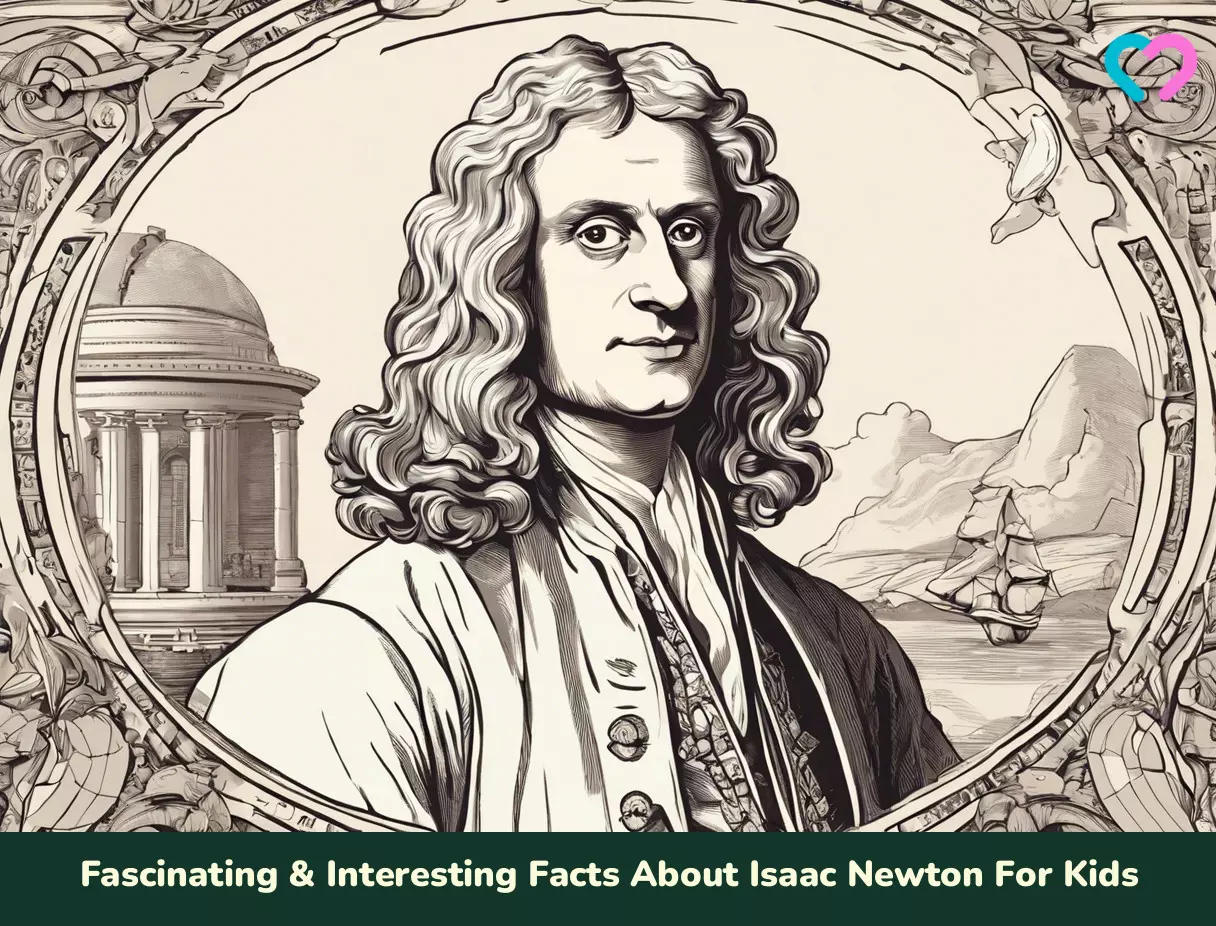
Image: Stable Diffusion/MomJunction Design Team
Discover the basics of motion with Newton’s 3 Laws! This educational video breaks down the principles of mechanics in a fun and engaging way for young learners.
References
- Isaac Newton.
https://plato.stanford.edu/entries/newton/ - Isaac Newton.
https://mathshistory.st-andrews.ac.uk/Biographies/Newton/ - Sir Isaac Newton.
https://starchild.gsfc.nasa.gov/docs/StarChild/whos_who_level2/newton.html - Issac Newton.
http://galileoandeinstein.physics.virginia.edu/lectures/newton.html - Isaac Newton: Who He Was Why Apples Are Falling.
https://education.nationalgeographic.org/resource/isaac-newton-who-he-was-why-apples-are-falling/ - Isaac Newton: the first physicist.
https://web.physics.wustl.edu/alford/general/newton.html - Isaac Newton.
https://makingscience.royalsociety.org/s/rs/people/fst01801333 - 5 Things You Never Learned (or Forgot!) About Sir Isaac Newton.
https://rsc.byu.edu/converging-paths-truth/brief-survey-sir-isaac-newtons-views-religion - Newton, Sir Isaac.
https://www.oxforddnb.com/abstract/10.1093/ref:odnb/9780198614128.001.0001/odnb-9780198614128-e-20059
Community Experiences
Join the conversation and become a part of our nurturing community! Share your stories, experiences, and insights to connect with fellow parents.
Read full bio of Theresa Bertuzzi
Read full bio of Sravani Rebbapragada
Read full bio of Harshita Makvana
Read full bio of Praggya Joshi












